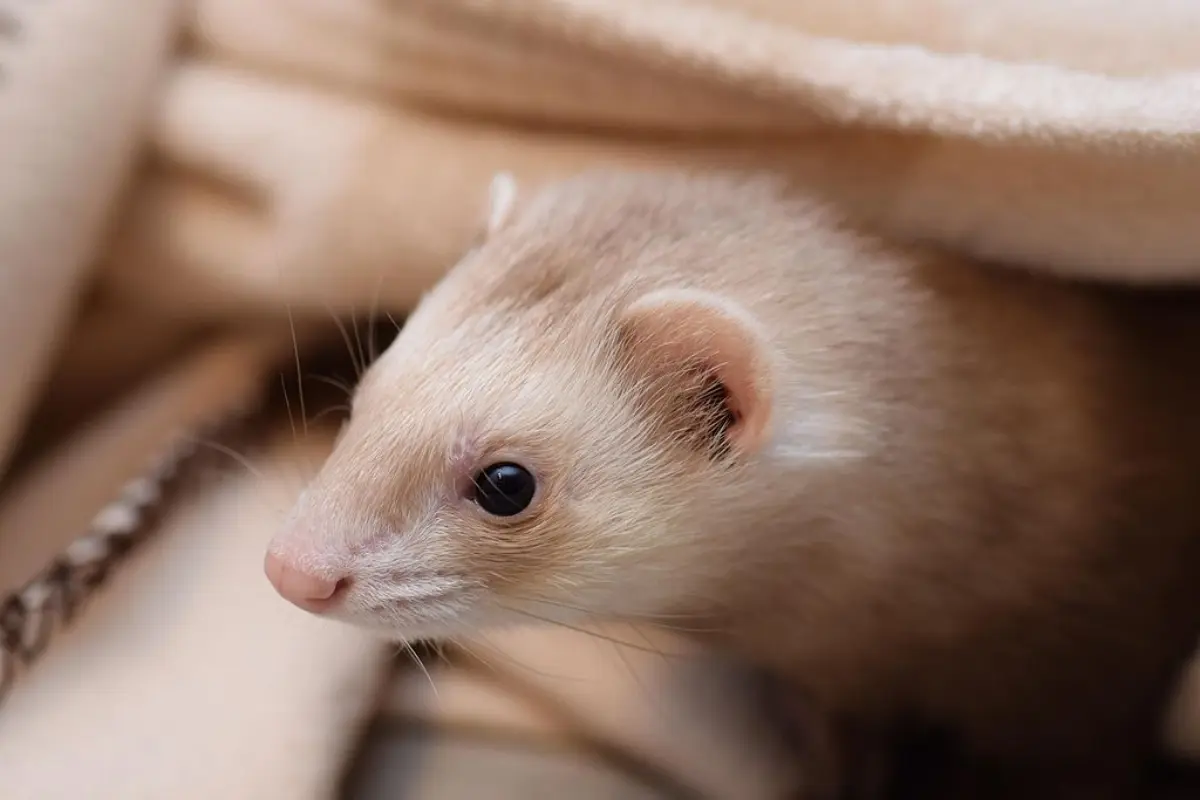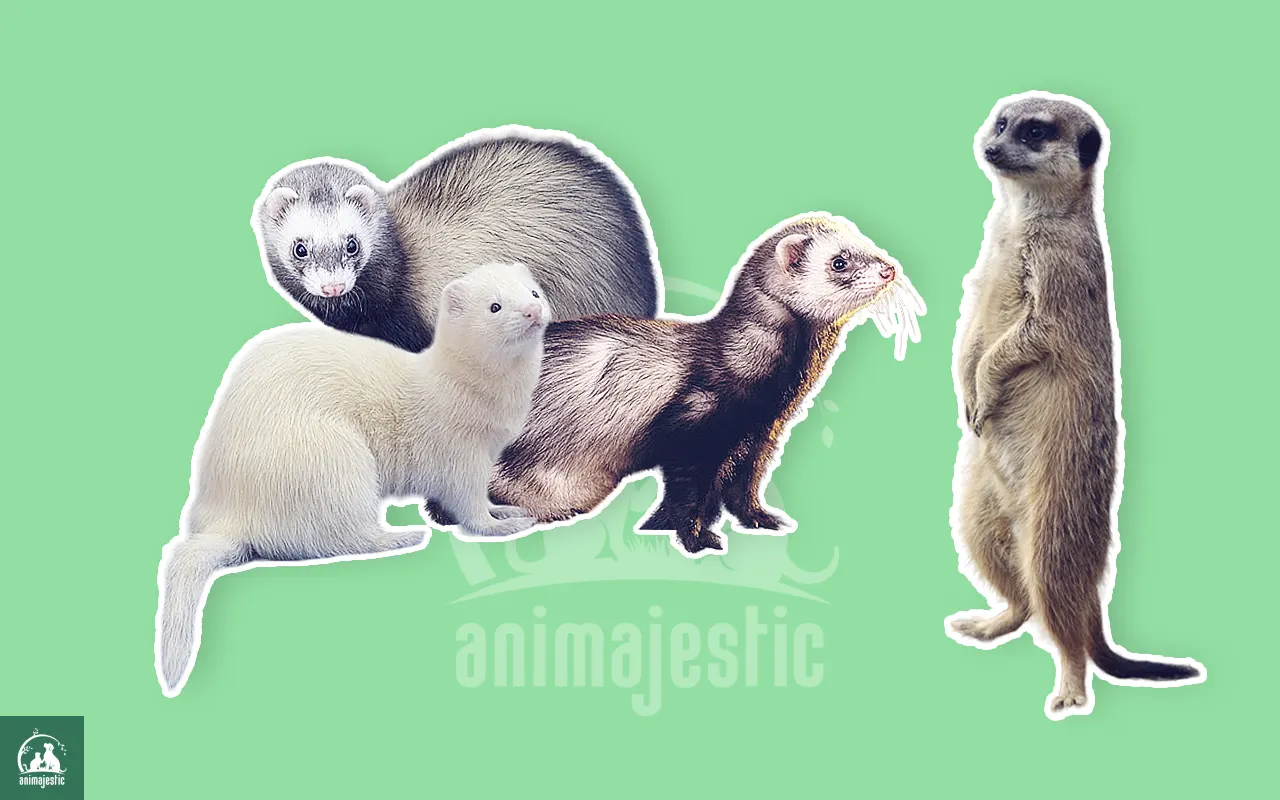Ferrets as pets? Ok, picture this: You’re settling in for some quality couch time, and out of the corner of your eye, you spot a fuzzy blur. It’s your ferret, leaping, sprinting, and tumbling like a pint-sized gymnast.
They’re a master of fun, pulling you in with their boundless energy, and suddenly, you’re laughing uncontrollably.
These captivating carnivores have stolen the hearts of pet owners worldwide, thanks in part to their playful antics and curious personalities.
I’ve sometimes had a few of these lovable critters around me. Trust me, life with a ferret is very exciting and interesting!
But, are you ready for the fantastic adventure that comes with having ferrets as pets and you are fully ready to be their parent?
Buckle up and get ready to find out if you and a ferret are a match made in fluffy heaven!
About This Specie
Family: Mustelidae
Length: Narrow body: 20-46cm in length, Tail: 7-14cm long, and short legs.
Lifespan: 7 – 10 years (With good care)
Class: Mammalia
A Brief History of Ferrets as Pets
Domestication and Purpose
Ferrets have been domesticated for thousands of years, potentially dating back to around 500 BCE. Originally bred for hunting and controlling rodent populations, they have since evolved into lovable household pets.
Through selective breeding, humans have created a variety of ferret colors and patterns, further enhancing their appeal as pets.
Ferrets and The Weasel Family
As members of the Mustelidae family, ferrets are closely related to weasels, otters, and badgers. Domestic ferrets, or Mustela putorius furo, are believed to have descended from the wild European polecat.
While some physical similarities remain, domestic ferrets have been specifically bred as pets and are distinctly different from their wild counterparts.
Choosing Your Ferret: Important Considerations
Before adopting and bringing a ferret into your home, it’s essential to consider the following aspects:
- Lifespan: With an average lifespan of 5-10 years, ferrets require a long-term commitment from their owners.
- Legal Restrictions: Some states and municipalities have restrictions surrounding exotic animals, including ferrets. Make sure to double-check any regulations in your area before adopting a ferret.
- Allergies: Ferrets produce fewer allergens compared to cats or dogs, but may still cause mild to moderate allergic reactions in some individuals. Spend time with a ferret before committing to ownership to ensure you don’t experience an adverse reaction.

The Perfect Ferret Dwelling: Cage Setup and Enrichment
Creating a comfortable and stimulating environment for your ferret is crucial. Keep the following in mind:
Housing
- Opt for a spacious, multi-level cage with horizontal bars to allow climbing.
- Provide soft bedding material, such as fleece or fabric, to create a cozy sleeping area.
- Designate a separate corner for a litter box and offer water and food in separate areas.
Enrichment
- Ferrets are highly intelligent and inquisitive; ensure there are ample opportunities for play and exploration.
- Toys and accessories that encourage problem-solving, hide-and-seek, and other interactive games are desirable.
- Allocate a safe space outside the cage for your ferret to enjoy daily exercise and bonding time.
Understanding the Ferret Diet: What Your Ferret Needs to Thrive
A healthy diet is key to ensuring your ferret maintains optimal well-being. As born carnivores, ferrets thrive on a high-protein, low-fiber, and low-carbohydrate diet.
- Choose high-quality, commercially available ferret food to ensure appropriate nutrient balance.
- Avoid feeding fruits, vegetables, or any carbohydrate-heavy foods to prevent digestive upset.
- Treats such as cooked eggs or freeze-dried meat can be offered occasionally to add variety.
- Fresh water should be accessible at all times.
Ferret Healthcare: Keeping Your Ferret Happy and Healthy
Maintaining good health is a priority for any pet owner, and ferret parents are no exception. Regular veterinary visits and proper grooming practices are key to ensuring your ferret stays in peak condition.
Health
- Schedule regular veterinarian visits, including vaccinations and check-ups.
- Monitor your ferret for signs of common health problems, such as adrenal disease, insulinoma, and respiratory infections.
- Neutering or spaying is recommended to prevent hormone-related health issues and undesirable behaviors.
Grooming
- Regularly inspect and trim your ferret’s nails.
- Gently clean their ears with a cotton swab and specialized ear cleaner to prevent buildup and infection.
- Bathe your ferret no more than once a month, utilizing mild ferret-safe shampoo to avoid stripping natural oils from the skin and fur.
Socialization and Training: Building a Strong Bond With Your Ferret
Fostering a positive relationship with your ferret is integral to their happiness and well-being.
Socialization
- Introduce your ferret to family members and other household pets gradually and with supervision.
- Daily interaction, playtime, and handling outside of their cage encourage trust-building and bonding.
Training
- Ferrets can be trained to use a litter box, as well as learn tricks.
- Utilize positive reinforcement techniques, such as rewards and praise, to ensure successful training.
In summary, owning a ferret as a pet is a tremendously rewarding experience and opens the door to years of companionship and joy. By following everything stated above, you’ll be well-prepared to provide your ferret with a loving home and ensure their lifelong happiness and health.
